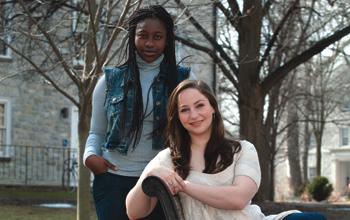Witnesses to History

Barbara Crentsil ’12 (left) and Daisy Ross ’12 settle back into life on Dickinson’s campus after a dramatic departure from Egypt.
Daisy Ross ’12 and Barbara Crentsil ’12 weren’t expecting to find themselves in the midst of a revolution after their second week of study at Dickinson’s partner program at the American University in Cairo.
But on Jan. 26, as Ross was bargaining for shoes in the marketplace and Crentsil was just passing through, Tahrir Square erupted. Thousands of Egyptians had gathered to overthrow the 30-year dictatorship of President Hosni Mubarak, and the Dickinson juniors found themselves among the protestors not knowing what to do.
“There were police barricades everywhere,” said Ross. “They were looking for any gathering of people that would be the start of something … waiting for something to happen.”
Though not expecting to be in the midst of a world-changing current event, both Crentsil and Ross were well prepared for their study-abroad experience, having immersed themselves in Egyptian culture even before they stepped into the country.
As a political-science major, Ross had studied Arabic for four semesters and took several classes on the Middle East before arriving in Cairo on Jan. 20. An Africana- studies and political-science major, Crentsil felt as if she were starting a new life when she headed for Egypt. Both women felt an instant connection with the country.
Just two days after the protests began, Crentsil received a call from Dickinson’s Office of Global Education, telling her she needed to leave the country.
“My first thought was ‘No, I don’t want to leave,’ ” Crentsil said. “The next day, another lady called me and told me the [logistics for her departure]. At that moment, I didn’t really understand the full impact of what was going on. We saw the protests, and people were yelling and shouting. I thought, ‘Oh, I’ve seen this in the U.S.; it’s not going to be a big deal.’ "
Ross later found out that Dickinson was the first school to begin bringing its students back from Egypt, as other universities were still awaiting advice from the U.S. State Department.
After arriving back at Dickinson on Feb. 1, the women struggled to find peace of mind. They remained emotionally invested and terrified as they watched the revolution unfold halfway around the world. Students greeted them with questions about the Muslim Brotherhood and the potential breakout of a radical Islamist revolution. Ross assured them that this wasn’t a revolution about religion. Egyptians put their lives on the line for freedom, a concept that many Americans take for granted every day, she told them.
Though they had intended to spend spring semester in Egypt, the women enrolled in classes in Carlisle and moved into a residence hall. They were offered counseling and time to catch up with their workload as well as constant support from their professors. With the help of their friends and family, Crentsil and Ross coped with the disruption of their study-abroad plans and feelings of being left out as classes resumed at the American University in Cairo.
As she settled back into her American life, Ross ruminated over the revolution she had witnessed. Now that Mubarak has stepped down, Ross hopes the United States continues to support the Egyptian people. “Stability does not equal democracy, but if we promote democracy we need to deal with the instability associated with it,” she said.
Crentsil and Ross assert that this is not the end of their relationship with Egypt but the beginning of a long-term commitment. They continue to watch the news as events unfold and hope to return someday when the dust has settled.
Published April 1, 2011